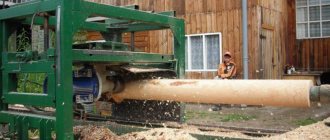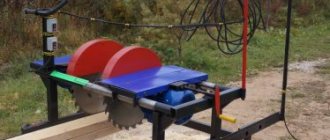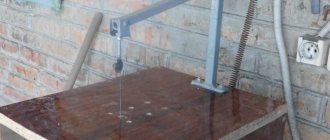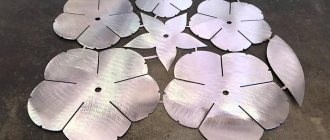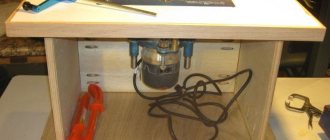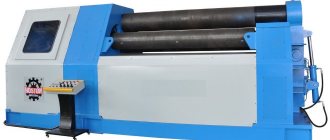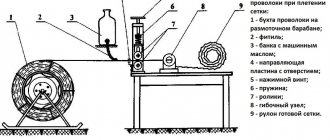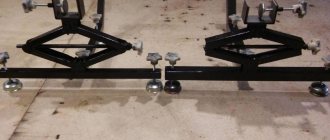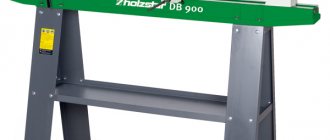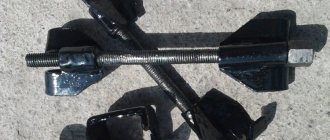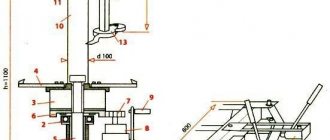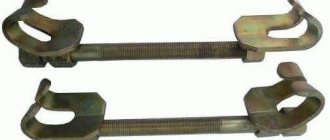Articles
All photos from the article
The construction of wooden housing in our great power has been developed since ancient times. First of all, this is caused by colossal reserves of this environmentally friendly and relatively inexpensive material. Despite the emergence of a lot of new construction technologies, classic log houses still remain popular. After all, the advantages of rounded logs are obvious, and they will be discussed further.
Photo of the construction of a classic log house.
Creating a machine yourself
To produce a universal device that works with wood, you will need:
- Vala;
- Bed, which is adjustable in height;
- Drill chuck;
- Electric motor.
This mechanism can easily sand, sharpen and cut wooden components.
When choosing an engine, do not lose sight of the following characteristics:
- Power in the range from 0.6 to 1.5 kW;
- Synchronicity;
- The average shaft rotation is about 2500 rpm.
The shaft must have a device for fixing the drill chuck. If there is none, then you will need to sharpen the end part of the shaft using a file. The diameter of the fastening must be slightly larger than the diameter of the cartridge. Then start the engine and sharpen the cartridge so that it is firmly attached to the shaft. Using lapping paste and a file, adjust the chuck to the required shaft size. If you do not have such a paste, you should rub the sandpaper and dilute its abrasive with oil.
Be sure to drill a hole and tap an M5 M6 thread in the center of the shaft, this will prevent you from accidentally slipping off the chuck. Also, don't forget to secure it with a countersunk head.
You can position the wood piece in different positions in relation to the machine.
Features of work
The frame is fixed to the table with two bolts, and the slats are secured using fixing brackets.
To build a frame, you will need six iron corners, the cross-section of which should be 2.5 by 2.5 cm, and one corner with a cross-section of 4 by 4 cm. Their length is 30 cm. Use a welding machine to connect
Pay attention to the quality of the welds, as the machine vibrates noticeably during operation
To make a countertop, you can use plastic, metal, plywood or boards.
To install parts on the table space, you will need to make brackets and strips. To install a cutter, saw or pulley into the chuck hole, you need to additionally make transitional bushings, as well as mandrels.
How to choose the appropriate method for constructing a log house?
To make a log house yourself, you will need to have some woodworking skills.
Before assembling the log house, the first thing you will need to do is make a design design, based on which you can choose the method of fastening the log house.
There are the following classifications of log house assembly:
- Based on the layout. The structure can have any shape you like. You can install an intermediate wall made from a log frame to create a five-wall structure.
- Based on the method of securing the logs together. There are 2 most common options: fastening “in the bowl” and “in the paw”.
- Based on the processing method of the material used. The building can be assembled from rounded or ordinary logs, laminated veneer lumber or profiled timber.
Device
The installation has several main components. The bed is made in the form of a metal frame. It can have a rigid welded connection in the form of a rectangular pipe or a mobile connection of individual metal elements using bolts and nuts. It is the basis for fastening all structural elements.
The rounding machine contains guides along which the sawing tool moves. They usually form a single structure with a metal frame. In certain types of installations, the log moves along guides.
There may be one or two (front and back) headstocks. Their purpose is to secure and twist the log. On the headstock in some models of machines there is a dividing head, which serves to set a certain angle of rotation for different stages of processing.
The unit for fastening tools and moving mechanisms is a caliper.
The main purpose of the cutter is to fasten the cutting tool. It also provides reduced vibration, increased accuracy of operations and ease of entry into the workpiece. There are shaped and universal cutters.
The knives of the rounding machine are made of high grade steel. The cutting tool is attached to the cutter so that it can be easily replaced or removed for sharpening.
In addition, additional elements are installed. These are levers that make it easy to install the workpiece on the frame, and stop rollers that prevent it from sagging. There are also brakes and a carriage lock. They are used in machines with the function of removing the crown bowl and are installed at the end of the carriage. To excavate a longitudinal groove, a log rotation regulator is used.
Modern manufacturers of woodworking equipment equip such rounding machines with automated computer-controlled modules.
Formation of “cups” - connecting mounting grooves
The “cup” element is made using a milling unit and straight guides that feed the tool. After forming the groove, the cutter returns to its original position.
Such a structural unit can be part of the process flow - the edges of the laying groove, to which the axis of the “cup” is oriented, become the supporting base. In the most common arrangement, the cutter cuts into the workpiece below the center axis.
But, as practice shows, the best accuracy indicators are demonstrated by positional type machines, on which the cup cutter is installed on a support with a vertical cutter. In this case, the axis of the cup can be formed at different angles to the plane of the mounting groove. For such operation of the cup-cutting unit, it is necessary that the log is rotated along its axis and fixed in a new position.
If the rounding machine is not equipped with a cup-cutting module, equipment for cutting grooves can be purchased separately. The asking price is from 100,000 rubles.
Recommendations before purchasing
For the chosen level of productivity, it is important to consider the degree of automation of the rounding machine. In mechanized models, the operator loads and unloads logs, sets up and adjusts the mechanisms
He also monitors the quality of work performed, all stages of operations
In mechanized models, the operator loads and unloads logs, configures and adjusts the mechanisms. He also monitors the quality of work performed at all stages of operations.
In automated rounding machines, the specialist servicing it is assigned the role of process controller.
In semi-automated installations, the master joins the process after the machine has completed one cycle of operations.
Electric can work without interruption, provided that the power lines are reliable or there is an additional power generator. Gasoline requires constant refueling, but does not depend on external factors.
But the main choice is between pass-through and loop types. The pass-through will provide high productivity, sometimes at the expense of the quality of processing. Most models of such machines do not have the ability to make the surface of the log smooth, without burrs and roughness. Cyclic installations work much slower, but at the same time they have a number of advantages:
- provide very high quality processing;
- perform the entire set of operations;
- have compact dimensions;
- The design is stable and easy to maintain.
In addition to all of the above, price, equipment manufacturer and required processing quality play an important role.
Independent production of a machine for working with wood
It is preferable to make a homemade rounding machine using a sawmill. To twist the log, an electric motor is used, which is installed additionally. Instead of the front conical part, a stop is made, the bearing for which is the headstock located at the rear.
The production of a cutter occurs by assembling the constituent elements. A rail is used to move the cutter. The installation is reminiscent of a milling machine, since the log is installed in the existing grooves, then torsion occurs. As a result, the cutter begins to move along the log.
A homemade rounding machine is mounted on a hard surface, preferably concrete. When making the frame, sleepers or thick timber are also used.
Stages of machine assembly:
- Assemble the frame using a level to position it in a stable, horizontal position. Typically the frame height reaches 20 cm.
- Mounting the power structure (front and rear headstocks), onto which the electrical cable fastening cable is pulled.
- Equipping power racks with a stopper.
- Providing grounding.
- Connecting a motor that causes the log to twist. In this case, you should focus on the exact connections of the phases. If connected incorrectly, the direction of the power head will not coincide with the direction of the buttons.
- Checking the direction of log torsion. If the direction is incorrect, the phases on the electric motor must be replaced. It should be remembered that until the power phases are correctly connected, rotational actions of the log and the engine are prohibited.
You should also secure the headstocks firmly, installing them simultaneously with the guides. The lines of movement of the rack axes should be similar. To do this, measure the exact length between the longitudinal profile and the central part of the post and between the nearest guide and the center of the headstock. These distances must be equal for both headstocks.
The cutters are installed on a conical element, and they are secured with bolts. It is necessary to maintain the balance of the cutters and the change in sharpening of the knives.
After all installation operations, you should check the correct assembly and horizontal frame.
After standing for a long time without using your machine or being in a damp room, you need to keep the installation in a dry room before starting it to remove excess moisture.
Video: homemade rounding machine.
How to care for a log building?
The following nuances need to be taken into account:
- Logs for the structure must be harvested in winter. As a result, logs will be more resistant to atmospheric precipitation and will be less susceptible to rotting. To check whether the wood was harvested in winter or not, you will need to drop iodine on the base of the material. If a blue spot appears, then the forest was harvested in winter.
- All wood elements will definitely need to be treated with antiseptic agents in order to be able to extend the service life of the structure.
- Before building a log house, it is necessary to create all the crowns on the surface of the earth, mark each log and install each element on the foundation in the same order.
- If you purchase ready-made logs for a log house, you need to make sure that the manufacturer marks them.
- All joints and gaps must be filled with tow so that the heat capacity of the structure can be increased and the building will have a good appearance.
- If the “paw” method is used for tying logs, then you will need to additionally protect the corner joints. To do this, it is best to cover it with boards.
- The height of the building during shrinkage will decrease by approximately 5-10%.
- The rafter structure must be tied to the 3rd or 4th crown using wire. This will increase the roof's resistance to wind gusts.
- To prevent cracks from forming in the log, you need to saw through the material to the center.
- If there are cracks in the logs, it is recommended to caulk them with tow.
- The tow should not protrude beyond the wood, otherwise it may begin to get wet, causing the logs to rot.
- Caulk work is carried out in dry weather so that the material does not get wet.
- To be able to prevent the wood from moving and increase the stability of the log house, the logs must be secured with dowels, which are mounted in holes made in the center of the material.
To get a reliable log house that will please the eye, you just need to know the manufacturing technology and follow the sequence of actions. It is important to have high-quality materials from which the log house will be made.
Features of the rounding machine
The rounding machine itself belongs to the category of woodworking equipment. With its help, rounded logs and profiled beams are made from round timber.
Modern equipment for rounding timber, in addition to round timber and profiled timber, can produce logs completely ready for laying without reinstallation. In one installation:
- give the log a diameter that is the same along its entire length;
- select mounting grooves;
- crown bowls are cut out;
- make a compensation groove before drying;
- mill smooth surfaces.
When retrofitting the machine, you can produce:
- sawing round timber into carriages and boards;
- receiving edged boards;
- sawing of linear products.
Logs up to seven meters long can be processed on such machines. Modern equipment is equipped with computer-based automated control. A given program can process wood into complex profiles and different diameters.
Design
Like any other machine, the rounding machine consists of the following components:
- Bed or frame. It bears the main loads (stress concentration, vibrations, bending moments) due to the fact that other nodes are fixed to it.
- Guides. Ideally level with smooth surfaces for easy movement of the sawing device.
- Front and rear headstock. Serve to secure round wood before processing. The centers of the headstocks must match. Otherwise, the output will be defective, and the shape of the log will be a truncated cone. The headstock is equipped with a mechanism that rotates the workpiece and a dividing device with a fastening system. With its help, you can rotate it to the required angle and fix it in this position. This improves the quality of the final product.
- Levers. They are used to facilitate lifting and proper installation.
- Caliper. Tools and moving mechanisms are attached to it.
- Processing tool. The cutting tools are prefabricated milling cutters. Quick-change knives made of high-quality steel allow highly efficient processing without wear to the main structure of the cutter. Structurally, the cutters are made universal and figured. The shaped cutter selects the mounting groove, and the universal one carries out the rest of the processing.
- Thrust rollers. When processing a long workpiece, it sags. The videos are designed to eliminate this drawback. Thrust rollers are also used for longitudinal milling. When removing a layer, the cutter provokes bending of the workpiece, so the thrust roller is installed opposite the tool and moves with it along its entire length.
- Brakes. When transversely processing (removing bowls), it is necessary to exclude longitudinal movement of the caliper. Mechanical brakes ensure reliable fixation.
- Manual adjustment. It is required for fine adjustment when cutting the mounting groove and bowl.
What affects performance
To determine the basic parameters of the material, there is a set of regulations. In our country this is GOST 2708-75, in the west ISO 4480-83. There is no big difference between them, the main parameters are identical. It is on this data that a program such as a calculator for rounded logs of volume, weight, density and other characteristics is based.
Array volume table.
Advice: it is desirable that the table of volume of rounded logs be original, that is, taken from the above-mentioned regulatory documents. Since now there are many corporate tables compiled taking into account the commercial interests of some corporations and containing inaccuracies that are beneficial specifically for those who compiled them.
Machines and equipment
Even 50 - 100 years ago, every carpenter or just a good owner knew how to round a log at home. Due to the fact that this occupation is long and very labor-intensive, with the development of woodworking production there are not many real specialists left.
Of course, in the debate about whether a log or a rounded log is cheaper, an ordinary unprocessed trunk wins. But building a good house or a high-quality bathhouse from “wild” material is almost impossible. Apart from the time spent on handicraft cylindering and labor-intensive installation, you will not be able to seal the seams and joints hermetically. Accordingly, the room will be cold and will not last long.
A machine for cylindering logs is, in fact, a symbiosis of milling and turning functions. Such equipment has impressive dimensions and includes a common metal frame on which they are based, a power unit, which can consist of several power units.
The main work is done by the headstock. It is on it that cutters for stripping the top layer and figured cutters for finishing the log are installed. The tailstock, as in most similar equipment, serves to fix and feed the workpiece itself.
If you want to know how long it takes to make a rounded log, then in this case it depends on the quality and functionality of the equipment. Modern automated lines are capable of turning a high-quality calibrated product from natural logs in a matter of minutes, according to specified parameters.
All such units come in two types – continuous and cyclic. The first ones are designed for large production volumes and have a minimum of functions. In them, the material moves in a continuous flow and, passing through the working area, is cylindered and milled.
Installing the workpiece on the machine.
Aggregates of the cyclic type perform a given algorithm of actions, after which the cycle is repeated. They, in turn, are divided into cyclo-pass type, where the barrel moves and the carriages are in a fixed position. And cyclo-positional, where the log is motionless and the carriages move around the workpiece.
As a rule, a do-it-yourself machine for a cylindrical log is made on the basis of a sawmill, where a stop is installed instead of the front cone, and the tailstock is replaced with a bearing or a rotating cone. The workpiece secured in this way rotates due to an additional drive or with your own hands, which is very difficult and inconvenient.
Processing is carried out by a milling head mounted on separate guides. The very principle of operation of such a handicraft unit is reminiscent of the operation of a wood milling machine. A rotating workpiece is gradually processed by a milling cutter moving along guides.
Advice: due to the serious weight of the workpieces themselves, experts recommend rigidly mounting such equipment exclusively on a concrete base. If this is not available, as an option, you can lay a reinforced concrete slab for the floor.
General diagram of the machine.
A few words about the characteristics
Domestic production is more focused on the so-called lunar profile of rounded logs. It contains a mounting cup for connecting the crowns and a compensation cut.
This cut serves to compensate for the natural internal stress of the array, as well as temperature and humidity expansion. Such a product is cheaper to manufacture, plus it does not require careful preliminary preparation of the material.
The Finnish profile provides a tighter connection of the crowns; therefore, less sealing materials are needed, but the log requires careful drying and preparation, as a result the price of the Finnish profile is higher.
The working height of the rounded log is 6 meters. This does not mean that products cannot be larger or smaller.
It’s just that most technological lines are oriented towards this size. An increase in height entails an increase in cost. The price of smaller barrels depends on the quality and complexity of processing of a particular product.
Storing goods in stacks.
As for the diameter, the working range here ranges from 160 to 320 mm. Rounded logs of 400 mm or more are processed on special machines. Such non-standard goods are used to equip the main crowns of the building, as well as other important load-bearing units. In addition, the walls of the first floors for multi-storey cottages are sometimes erected from logs with a cross-section of 400 mm.
The cost of the product is greatly influenced by the method of drying the massif. Natural drying takes place for about six months under open sheds in natural conditions. Such a product costs less, but its shrinkage is higher.
Chamber drying involves processing the material in special high-temperature chambers. Such a log shrinks less and is considered to be of higher quality.
Important: glued rounded logs appeared on the market relatively recently. The price for such products is much higher. But, according to experts, they are of exceptional quality.
The video in this article contains materials on this topic.
Stages of designing a machine yourself
Purchasing a professional installation for producing processed wood is an expensive proposition. But there is an alternative solution: you can make a machine for rounding logs with your own hands.
A sawmill is used as the base. The cone in the front part is replaced with a stop. A bearing is inserted into the tailstock. You will also need an electric motor to ensure the torsion of the log. The rotation can be manual, then you need to make a handle.
The cutter is assembled as a separate unit from a very durable material. Its movement can be ensured by laying rails. This is the path along which the cutter will move. In this design, the workpiece must be positioned along the rail and rotated so that the cutter slides along it.
Before installing the rounding machine, concreting (if not available) or compacting the area of the required size is carried out. Next, the frame sections are assembled and leveled in the horizontal plane. The maximum installation error should not exceed 0.5 mm per 1 m in all directions. Installation height 20 cm.
The subsequent assembly steps are as follows:
- installation of the power mechanism;
- installation of the front and rear headstocks so that their axes coincide and are parallel to the guides;
- fastening racks for cables for mobile power cables;
- cable tension;
- clamp-stop equipment for the power mechanism;
- grounding installation;
- connecting the motor and checking the direction of rotation of the lumber. The desired direction is regulated by changing the order of connecting the motor phases;
- mounting a shaped cutter on a conical part using bolts;
- screwing a universal cutter into the body of a figured cutter. In order to avoid imbalance, the knot is tightened with a wrench;
- checking for correct assembly.
A homemade machine requires preventive maintenance if it is idle for a long time or installed in a damp room.
The construction of a private house, cottage, or residential log house requires high-quality timber, which is processed using professional equipment. For technical buildings, you can round the wood yourself.
Installation
For work, an old sawmill is used, on which the body is replaced with a stop and tailstocks for clamping an unbarked trunk. A tapered or other roller bearing is installed as a holder. In order for the log to easily rotate along its own axis, you will need an additional motor; the manual process will take a long time. To move the cutter, the simplest solution would be to lay a rail track. There is no need to drag heavy whips by hand. The distance between the transverse sleepers that reinforce the structure and on which the rail is attached is no more than 1 m; for installation, timber impregnated with special compounds or ready-made sleepers are used. Installation of a homemade machine for rounding begins with assembling the frame. Using a welding machine, its sections are prepared separately. And during assembly, they check with a level so that the structure is in the same plane. An error of 0.5 mm per meter is allowed, since perfect evenness will still not be achieved, and a heavy log will smooth out the discrepancy in the future. The milling unit is strengthened and assembled from parts of a lathe. After all, in addition to rounding, you need to cut out a cup on the barrel. This requires a special vertical cutter, which is made independently or ordered from the manufacturer’s catalog.
Now connect the motor for rotation. Immediately provide a power supply with the recommended voltage in the room intended to be a home sawmill; the power cable must go separately and be connected to an independent panel, otherwise constant knocking out of household appliances in the house cannot be avoided, which cannot affect their operation. The engine is strengthened with anchor bolts. The correct connection is indicated on the case; the movement of the power head must coincide with it. In case of mismatch, swap the phases. Connection cables for various components are installed over the entire length of the finished machine with a margin. Safety of use lies in strengthening them above the machine with flexible holders. You cannot let the cable sag, much less touch the working surface - cutting is fraught with consequences. Before putting into operation, the machine for rounded logs is checked for parallelism of the axes of the headstocks, front and rear. The moving cutter must run exactly horizontally. If this is not done, the least trouble that occurs during operation is the curvature of the barrel. Large – failure of the entire system. In addition, the error of parallel lines leads to the play of the log, especially with poor fixation.
The device of the machine for cylindering
The log processing machine drawing includes:
- a metal frame, usually made of rectangular rolled pipe;
- guides for moving saw and power devices;
- headstocks for fastening the log and twisting it. The front one is equipped with a dividing head, with which the barrel is fixed. The spindle head is also installed there;
- Wood is processed using cutters. The shape cutter selects the groove for installation. The universal cutter is designed for cutting crown cups, processing planes, and rounding;
- knives for cutters are removable. Made from good steel, they can be replaced and sharpened without touching the cutter;
- levers for placing logs;
- stop roller to prevent logs from sagging;
- mechanical brakes are installed at both ends of the carriage and are used during removal of the crown bowl;
- the carriage lock stops it while removing bowls;
- device for manually rotating the barrel: used when cutting a longitudinal groove.
Equipment functions
When choosing an OS1 400 machine, models from Sherwood or other leading manufacturers, you should know what functionality you can count on when purchasing such a unit.
The OTS rounding machine, like its competitors and analogues, performs the following functions:
- The grooves necessary for mounting different types of logs are made;
- Logs are rounded;
- They produce edged boards based on a carriage;
- Making dies for parquet;
- I mill a smooth wood surface;
- It is not edged boards that are cut;
- The crown cups are prepared;
- They make timber;
- They saw the wood into a carriage;
- Regulate the speed of rotation of the log;
- Compensation type grooves are made using a circular saw.
An important feature of woodworking machines is that equipment of this type can perform a wide range of operations without the need to reinstall the log itself. Special cutters and units with which the machine is equipped make it possible to produce parts of different diameters and complex configurations using units of this type. The master, having at his disposal an OS1 400 rounding machine, can easily process a log with his own hands, the length of which is about 7 meters.
Price plays an important role when choosing Sherwood equipment or its analogues. The same Kedr machine model OS 100 costs from 210 thousand rubles. If you want to purchase an ODS machine, get ready to pay 750 thousand rubles.
Largely due to the high cost, instead of factory equipment of this type, many people prefer to assemble a homemade rounding machine. An experienced craftsman, having drawings, is capable of constructing such a machine with his own hands. But it is strongly not recommended for a beginner to take on a homemade machine if his goal is to obtain high-precision processing equipment.
Device Features
The Altai rounding machine, like its competitors, have approximately the same design. Therefore, all units of this type consist of:
- Metal frame. In most cases, it is made from rectangular pipe;
- Guide for moving the power unit and cutter;
- Grandmas. It serves to fix the log and give it rotation. The headstock is characterized by the presence of a dividing head, which allows you to fix the barrel. The spindle is also located here;
- Milling cutters. Special shaped cutters select grooves for subsequent installation. A universal cutter allows you to cut crown cups, process planes and perform rounding on Sherwood machines;
- Knives for milling cutters. They are made from high-strength steel. At the same time, the design of the equipment allows you to change and sharpen the cutter blade without removing the latter;
- Lever for placing the processed log;
- Stop rollers. They protect the log from sagging;
- Mechanical brake. It should be used when selecting crown cups;
- Carriage latches. The latch stops the movement of the carriage when the bowls are being removed;
- Devices for rotating logs. The master uses this type of mechanism to make a longitudinal groove on Sherwood machines and its analogues.
Selecting a machine for the production of rounded logs
To select a machine, you should not rely on advertised settings. It is necessary to evaluate the proposed samples well. Of course, it is useful to visit factories where such machines are used. Communication with direct equipment operators will bring good results when choosing an installation.
The following models are widely represented on the Russian market: Rus, Sherwood and Termite. Sherwood and Rus equipment can be separate components, or be part of a woodworking system. The volume of logs that passes through these installations is 24 cm. There are models that pass larger diameters. Such installations are used when processing various materials: birch, oak, ash, pine and others.
Of course, you can buy popular machines, but sometimes you have to modify them to suit your own needs. Therefore, a more practical way is sometimes to make a rounding machine with your own hands.
Features of the design of machines for cylindering
The installation consists of main blocks - a metal frame, headstock and tailstock, cutters. Typically, square pipes with guides for the movement of the load-bearing structure and carriage serve as the frame. Headstocks are required to secure the log in the central part and to push for rotational actions.
The main running tools are cutters. They provide easy entry into the wood, reducing vibration and increasing accuracy. They come in universal and curly shapes. The universal cutter is used for classical rounding, milling and sampling of crown cups. A shape cutter is used when making grooves.
The cutters are equipped with knives that can be removed. If the obtained log parameters do not match, the knives must be replaced. They are made of durable steel and are used for a long time.
To reduce time and make placing the log on the frame easier, levers are used that are installed in the center of the log. To select a crown cup, you need to securely attach the carriage. Therefore, brake devices are used, placed at the ends of the carriage. If you need to get a longitudinal groove, then use a convenient wood rotation regulator.
Classification
Currently, three types of rounded logs are available to consumers, differing in cost, as well as quality and processing technology:
| Natural humidity |
This is explained by the fact that at the first stage the house goes through a natural process of shrinkage and shrinkage. |
| Dry | Buildings constructed from such material do not require shrinkage, since it occurs during the production process. In this case, the latter consists of 2 stages:
Having gone through all stages of preparation, the workpieces are processed to final size, and then the bowl and heat lock are cut. The duration of the production process has a direct impact on the cost of the material, which is an order of magnitude higher than those logs that require a natural drying process. |
| Glued | The most expensive building material of this type, this is due to the complexity of the production process. |
Processing stages
- First, the logs are sorted depending on their type and purpose.
- All rejected material is selected for further processing into lumber.
- The process of making rounded blanks is the most important processing stage. For these purposes, equipment for rounding logs is used - turning and milling machines belonging to the heavy class. During processing, the logs are given the shape of a regular cylinder, and the thickness of all workpieces should be the same.
- Next is the milling of the mounting groove, designed for stability and a tighter fit of the logs in the structure.
- A compensation cut is made on each log to avoid cracking during drying.
- A rail track is necessary so as not to drag the log along the cutter manually, but it moves itself. The principle of operation of such an installation is similar to a conventional milling machine - the cutter moves along a fixed rotating workpiece.
Foundation
- It is necessary to make a concrete platform for the machine. If this cannot be done, you can install the equipment on dense ground, securing it to guide wooden sleepers 1.5 m long, located across the machine. Leave a distance of 1 m between sleepers.
- On a site - concrete or prepared soil - sections of the frame are installed so that each of them is located strictly horizontally and at the same level. An error is allowed, but it should not exceed 0.5-1 mm. If the site is concrete, the frame is mounted at a height of 150 to 200 mm. All joints formed during the installation process should also be concreted.
- After this, you can begin installing the power unit, as well as headstocks (front and rear) and racks, onto the frame. To secure the electrical cable, pull the cable over the posts. At the last stage, install a clamp on the power unit, and then ground the machine.
- Make sure that all phases in the power supply and on the motor are connected correctly. To do this, start the machine and check the correct operation of the cutter and the direction of rotation of the workpiece. And if something goes wrong:
- the movement of the cutter does not coincide with the control panel;
- the log is rotating in the wrong direction
the phases, both in the network and on the motor, should be swapped.
Exploitation
Before you start using a machine you made yourself, you need to check the correct placement and rigidity of the headstocks. This stage of work should not be skipped, as it is very important.
All headstocks must be placed parallel to the guides, and their coaxiality is measured by measuring the distance between their center and the longitudinal profile, as well as the nearest guide. The distances should not differ from each other by more than 1 mm.
Before you start using the machine for rounding logs with your own hands, you should check that the frame is positioned correctly horizontally. To do this, a gasket is placed under it, the thickness of which is equal to half the taper. In this way, you can determine how parallel the axis of the headstocks is to the plane of movement of the cutter.
Operation and care
At production sites, the production of finished logs can be up to 800 m per work shift. At home, this is hardly possible, and it is not necessary. To get several pieces of high-quality CBs for future construction per day, follow the rules of safe operation and carry out timely preventive maintenance. So:
After a long period of inactivity, you cannot immediately cut and trim logs; it is important to warm up the machine for rounding the log, check the condition of the cutter, lubricate all moving parts, and inspect critical parts for corrosion. The insulation of the power cable should not cause any complaints; rodents can feast on it
The reliability of the suspensions should also be high.
Before putting the machine into operation, it should be tested: at idle, under load (a short period is used for this), for a while. If the result is satisfactory: the quality has not been lost, the time has been met, the parts have not failed, then they carefully begin work, having first cleared the machine of chips. During operation, a common cause of failure is the heating of the bearings; do not allow the temperature to rise above 60 degrees. If there is no cooling system, then the problem is solved by installing a fan or working with the doors open. You can determine overheating yourself. A factory unit always has oil baths, into which the proper level is poured and checked with a dipstick; a makeshift unit will have to be constantly lubricated. For this purpose, industrial liquid oil and grease are chosen for hard-to-reach places. Change waste material at least once every 3 months. Together with it, clogged dust, dirt and shavings are removed.
Perform routine and major repairs on a homemade log rounding installation in a timely manner. In the first option, complete disassembly may not be necessary if prevention was carried out on time. At this stage, bearings, bolts, fasteners are replaced, the sharpness of cutting tools is checked and, if necessary, they are changed.
Major repairs are carried out only by the efforts of an electric motor service specialist and an assembler. That is, the power unit is removed and sent to the workshop. Doing something yourself, in the absence of knowledge and experience, is not recommended. You can only replace the bearings on the rotating shaft yourself.
Your own rounded machine will bring benefits to its owners only when the decision to assemble a sawmill for the production of central fiber boards is verified from all sides - this is a lot of work that requires responsibility. In addition, you cannot expect great productivity from a do-it-yourself rounding machine, so take a closer look at used equipment.
Andrey Ponamarev
Author of publications on 1Drevo.ru with the topics: Polishing the house | Log house made of rounded logs | Insulation of a log house | Houses made of profiled timber | Houses made of laminated veneer lumber | Outbuilding made of laminated veneer lumber | Pine windows | Construction of a house from cylinders | Wooden floors | Cladding walls with clapboard | Porch | Material for home, etc.
